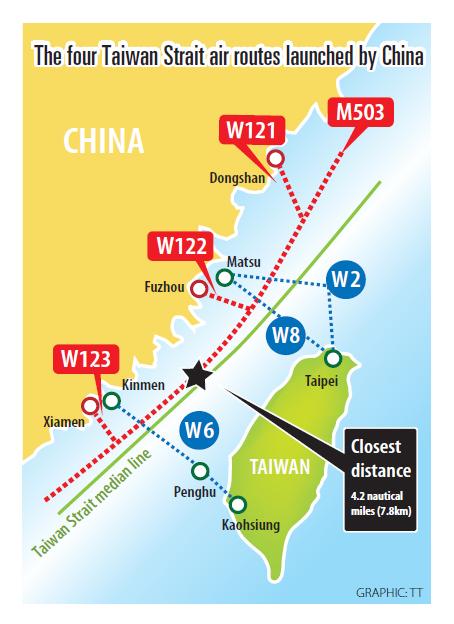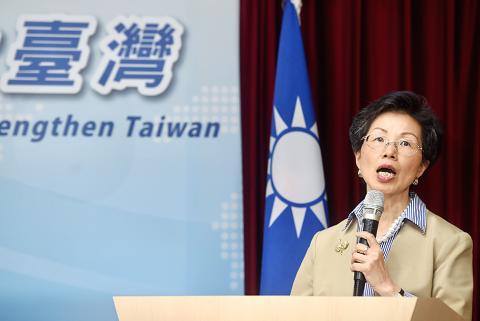Beijing should immediately stop all flights on four civil aviation routes that were launched yesterday morning, the Mainland Affairs Council (MAC) said yesterday, adding that aviation officials across the Taiwan Strait should begin negotiations on the issue as soon as possible.
“China must be held accountable for any serious consequences that would affect the cross-strait relations should it continue to allow the flights to operate,” MAC Minister Katharine Chang (張小月) said at a news conference in Taipei.
The aviation routes are northbound flights on the north-south M503 route, which is very close to the median line of the Taiwan Strait, as well as three east-west extension routes — W121, W122 and W123 — along the southeast coast of China.

China unilaterally created the routes in 2015 on the grounds that they would be used to alleviate flight congestion on its A470 route.
Both sides then reached an agreement in 2015 following negotiations between civil aviation officials that only southbound flights would be permitted on route M503 and that the three extension routes would not be activated until after the negotiations had been completed, Chang said.
However, China simultaneously activated the three extension routes and allowed northbound flights to operate on the M503 route yesterday morning without negotiating with Taipei in advance, Chang said.

Photo: Chien Jung-fong, Taipei Times
“We believe that China not only breached the terms of the 2015 agreement, but it is also attempting to cover its malicious intentions toward Taiwan — both politically and militarily — under the guise of civil aviation. The move has generated concerns that it could potentially change the ‘status quo’ across the Taiwan Strait,” she said.
Since both sides of the Taiwan Strait agreed to allow southbound flights use the M503 route in 2015, the actual rate of usage had been very low, Chang said.
Civil Aeronautics Administration (CAA) statistics show that about 60 to 70 flights use the southbound M503 route daily.
The council has informed China’s Taiwan Affairs Office about the nation’s position on this matter through established channels of communication, Chang said, adding that its appeals were made out concerns for aviation safety.
Flights on the M503 route do not only carry Taiwanese and Chinese passengers, they also carry passengers from other nations and their safety could be affected by the launch of the new routes, Chang said, adding that the council has yet to receive an official response from China.
The nation would take corresponding measures if China ignores those demands, Chang said, without naming specifics.
Asked when China informed Taiwan about the activation of these four routes, CAA Director-General Lin Kuo-hsien (林國顯) said that his agency was not informed about the change until about 8am yesterday, when Chinese aviation officials in Fuzhou and Xiamen contacted air traffic control personnel in Matsu and Kinmen.
China then made an official announcement about the routes at 10am, he said.
Lin said that the 2015 agreement clearly stipulates that the M503 route is only for southbound flights, which in reality should operate 6 nautical miles (11km) west of the route.
If flights have to deviate from the designated route due to inclement weather or other reasons, the flights should move west, he said.
“We have not negotiated over the issues involving northbound flights on the M503 route or the three extension routes, so we want [China] to avoid using them, otherwise our air traffic control officers would not know how to guide the flights in emergency situations,” Lin said.
The W122 route is very close to that used by flights between Taipei and Matsu, while the W123 route could clash with the route used by flights to Kinmen from either Tainan or Kaohsiung, he said.
“The routes are also very close to the radar control towers in Kinmen and Matsu. This is why we need to negotiate on these issues,” Lin said, adding that the CAA had informed the International Civil Aviation Organization and the US about the situation.
Deputy Minister of the Transportation and Communications Frank Fan (范植谷) said that it was unacceptable that China activated the routes without prior negotiations with Taiwan, adding that 80 international and domestic Taiwanese airlines have been notified to not use any of the routes.

ENDEAVOR MANTA: The ship is programmed to automatically return to its designated home port and would self-destruct if seized by another party The Endeavor Manta, Taiwan’s first military-specification uncrewed surface vehicle (USV) tailor-made to operate in the Taiwan Strait in a bid to bolster the nation’s asymmetric combat capabilities made its first appearance at Kaohsiung’s Singda Harbor yesterday. Taking inspiration from Ukraine’s navy, which is using USVs to force Russia’s Black Sea fleet to take shelter within its own ports, CSBC Taiwan (台灣國際造船) established a research and development unit on USVs last year, CSBC chairman Huang Cheng-hung (黃正弘) said. With the exception of the satellite guidance system and the outboard motors — which were purchased from foreign companies that were not affiliated with Chinese-funded

PERMIT REVOKED: The influencer at a news conference said the National Immigration Agency was infringing on human rights and persecuting Chinese spouses Chinese influencer “Yaya in Taiwan” (亞亞在台灣) yesterday evening voluntarily left Taiwan, despite saying yesterday morning that she had “no intention” of leaving after her residence permit was revoked over her comments on Taiwan being “unified” with China by military force. The Ministry of the Interior yesterday had said that it could forcibly deport the influencer at midnight, but was considering taking a more flexible approach and beginning procedures this morning. The influencer, whose given name is Liu Zhenya (劉振亞), departed on a 8:45pm flight from Taipei International Airport (Songshan airport) to Fuzhou, China. Liu held a news conference at the airport at 7pm,

Taiwan was ranked the fourth-safest country in the world with a score of 82.9, trailing only Andorra, the United Arab Emirates and Qatar in Numbeo’s Safety Index by Country report. Taiwan’s score improved by 0.1 points compared with last year’s mid-year report, which had Taiwan fourth with a score of 82.8. However, both scores were lower than in last year’s first review, when Taiwan scored 83.3, and are a long way from when Taiwan was named the second-safest country in the world in 2021, scoring 84.8. Taiwan ranked higher than Singapore in ninth with a score of 77.4 and Japan in 10th with

GRIDLOCK: The National Fire Agency’s Special Search and Rescue team is on standby to travel to the countries to help out with the rescue effort A powerful earthquake rocked Myanmar and neighboring Thailand yesterday, killing at least three people in Bangkok and burying dozens when a high-rise building under construction collapsed. Footage shared on social media from Myanmar’s second-largest city showed widespread destruction, raising fears that many were trapped under the rubble or killed. The magnitude 7.7 earthquake, with an epicenter near Mandalay in Myanmar, struck at midday and was followed by a strong magnitude 6.4 aftershock. The extent of death, injury and destruction — especially in Myanmar, which is embroiled in a civil war and where information is tightly controlled at the best of times —